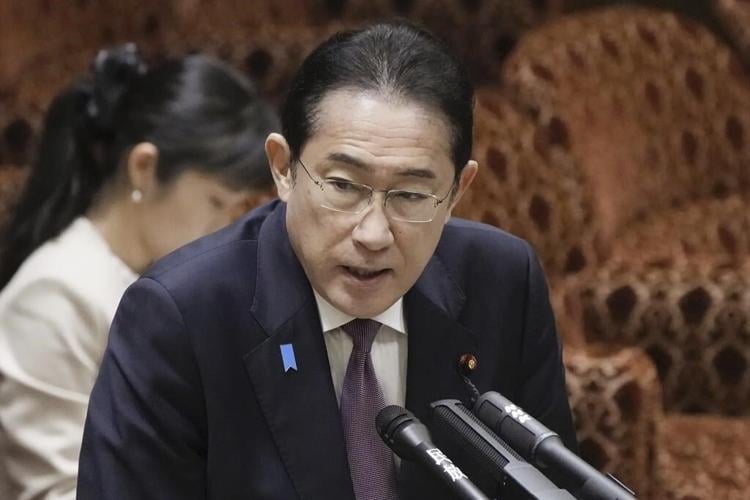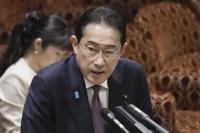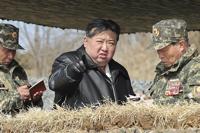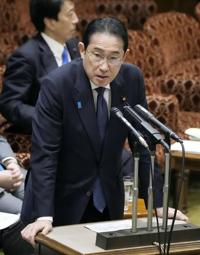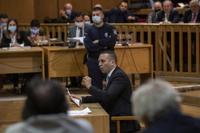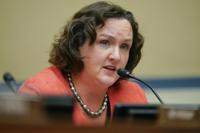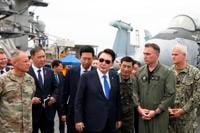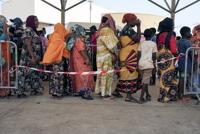SEOUL, South Korea (AP) ÔÇö North Korea said Monday that Japan's prime minister has offered to meet with North Korean leader Kim Jong Un but stressed that prospects for their countriesÔÇÖ first summit in about 20 years would depend on Tokyo tolerating the North's weapons program and ignoring its past abductions of Japanese nationals.
Japan acknowledged it has been trying to arrange a bilateral summit but dismissed North Korea's preconditions for such a meeting as unacceptable, dimming the prospects that Kim and Japanese Prime Minister Fumio Kishida would hold a summit any time soon.
Observers say Kim wants improved ties with Japan as a way to drive a wedge between the U.S. and its allies, while Kishida wants to use , a highly emotional issue for Japan, to boost his declining approval rating at home. After admitting in 2002 that North Korea allowed five to return home but said the others had died. Japan believes some were still alive.
In a statement carried by state media, KimÔÇÖs sister, Kim Yo Jong, who also is a senior official, said that Kishida recently used an unspecified channel to convey his position that he wants to meet Kim Jong Un in person ÔÇťas soon as possible.ÔÇŁ
She said there would be no breakthrough in North Korea-Japan relations as long as KishidaÔÇÖs government is engrossed in the abduction issue and interferes in the NorthÔÇÖs ÔÇťexercise of our sovereign right,ÔÇŁ apparently referring to the NorthÔÇÖs weapons testing activities. Simply deciding to hold a summit is not enough to improve ÔÇťrelations full of distrust and misunderstanding,ÔÇŁ she said.
In February, Kim Yo Jong issued a similar statement, saying North Korea was open to inviting Kishida to Pyongyang but that it would only be possible if Tokyo stopped taking issue with North KoreaÔÇÖs legitimate right to self-defense and the abduction issue.
Kishida, speaking in a parliamentary session, said that a meeting with Kim is ÔÇťcrucialÔÇŁ to resolve the abduction issue and that his government has been using various channels to discuss the possible summit. Japanese government spokesman Yoshimasa Hayashi told reporters later Monday that dropping the abduction issue in talks with North Korea is ÔÇťnot acceptable.ÔÇŁ
North Korea and Japan donÔÇÖt have diplomatic ties, and their relations have been overshadowed by North KoreaÔÇÖs nuclear program, the abduction issue and JapanÔÇÖs 1910-45 colonization of the Korean Peninsula. JapanÔÇÖs colonial wrongdoing is a source of on-again, off-again wrangling between Tokyo and Seoul, as well.
After years of denial, North Korea acknowledged in an unprecedented 2002 summit between Kim Jong Il, the late father of Kim Jong Un, and then-Japanese Prime Minister Junichiro Koizumi that its agents had kidnapped the 13 Japanese. Japan believes North Korea used them to train spies in Japanese language and culture.
Koizumi made a second visit to North Korea and met Kim Jong Il again in 2004, the last summit between the two countries.
Talk of a possible new summit comes amid concerns that North Korea could further intensify its weapons testing activities in what is an election year both in the U.S. and South Korea. Experts say North Korea would aim to use an enlarged weapons arsenal to win concessions from the U.S., such as relief from sanctions imposed because of Pyongyang's nuclear program.
ÔÇťWhile North Korea may be waiting out elections in South Korea and the United States before reengaging those countries in diplomacy, it probably wants to strengthen its hand by developing weapons and driving wedges between U.S. allies,ÔÇŁ said Leif-Eric Easley, a professor of international studies at Ewha Womans University in Seoul. ÔÇťKishida feels political urgency to address the abductions issue and is thus showing diplomatic effort.ÔÇŁ
The impoverished North also likely thinks about possible Japanese economic assistance it could receive if the two countries normalized their ties, said analyst Moon Seong Mook with the Seoul-based Korea Research Institute for ║┌┴¤│ď╣¤═° Strategy. He said North Korea could seek the current value of the Japanese assistance that South Korea received when those two countries normalized their ties in 1965 ÔÇö $500 million ÔÇö or more.
Moon said Kishida likely won't defy Japanese public opinion to make concessions on the abduction issue, or defy U.N. resolutions that ban North Korea's nuclear program. Easley said a Kim-Kishida summit is unlikely because Pyongyang appears unwilling to address its historical kidnapping of Japanese citizens and Tokyo is unable to relax sanctions on North Korea.
South KoreaÔÇÖs Foreign Ministry said Monday it was closely communicating with Japan on Tokyo-Pyongyang contacts and the North Korean nuclear issue. It said that South Korea, the U.S. and Japan are working closely together to return North Korea to a path of denuclearization.
North KoreaÔÇÖs advancing nuclear and missile arsenals pose a major security threat to Japan as well as South Korea and the United States. The three countries have expanded their trilateral training exercises in response to the NorthÔÇÖs provocative run of weapons tests since 2022. Japan and South Korea are two of AmericaÔÇÖs key allies in the region, together hosting about 80,000 U.S. troops in their territories.
Earlier Monday, reported that Kim Jong Un supervised a tank exercise and encouraged his armored forces to sharpen war preparations in the face of growing tensions with South Korea.
While most analysts doubt Kim is genuinely preparing for war, South Korean officials have raised the possibility of smaller provocations in border regions, including the disputed western sea boundary between the Koreas that has been the site of bloody skirmishes in past years.
___
Associated Press journalist Yuri Kageyama in Tokyo contributed to this report.
___
Follow APÔÇÖs Asia-Pacific news at

